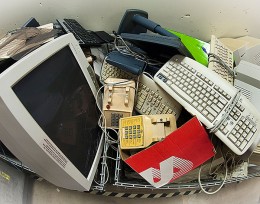
Wright State employees can recycle old electronics at the Office of Materials Management at Excess and Surplus Property Management in the Millett Hall basement.
Each month Wright State University sends a jumbled heap of computers, monitors, and cords off to be recycled. The mass of e-waste, which can also include old televisions and printers among other electronics, can weigh up to a ton and is eventually ground into piles of lead and sand.
At its current rate, recycling the e-waste costs about $5,000 a year, but Bill Palmer, an environmental compliance officer with Environmental Health and Safety (EH&S), is hoping to grow the program in a big way and drop the costs to almost zero.
It may sound like a pipe dream, but thanks to a new partnership with Goodwill Industries Wright State’s e-waste recycling program is poised to do just that, and support people with mental disabilities too.
Palmer said for years his office has had to turn staff, faculty and students away from recycling their old computers or parts through them because the program was only for university equipment. Wright State also paid for the service by the pound.
With the new deal, Goodwill is taking it all virtually for free. Anyone from the community can recycle their e-waste through the program now. All they have to do is drop it off.
“It seems like a win all the way around,” Palmer said from his office at EH&S. “It should save money, expand our program by opening it up to personal disposal, and it supports workers at the Goodwill site, many of which are mentally disabled and really depend on these jobs. I don’t see a downside.”
Palmer said the current collection volume, which ships about once a week, could easily be increased and ship daily if necessary—a boon to the annual Recyclemania program and campus sustainability in general.
Goodwill does clean and try to sell equipment that can still work. Parts that cannot be re-sold are exposed to an intense magnetic field that renders them inoperable forever.
“Goodwill has strict guidelines that it has to follow to make sure none of the recycled computers have your personal data or information still on them,” said Palmer.
Goodwill uses the Dell system for wiping the data off, which is on par with Department of Defense standards. Dell also audits the system each month.
Anyone interested in learning more about how they can donate their old electronic parts should contact Palmer at bill.palmer@wright.edu or visit the Office of Materials Management at Excess and Surplus Property Management in the basement of Millett Hall to donate their e-waste.


 Milling around
Milling around  Wright State recognizes Nursing Professor Kim Ringo for advancing international student success
Wright State recognizes Nursing Professor Kim Ringo for advancing international student success  Wright State honors graduating students for distinguished doctoral dissertations
Wright State honors graduating students for distinguished doctoral dissertations  Top 10 Newsroom videos of 2025
Top 10 Newsroom videos of 2025  Museum-quality replica of historic Hawthorn Hill donated to Wright State
Museum-quality replica of historic Hawthorn Hill donated to Wright State 